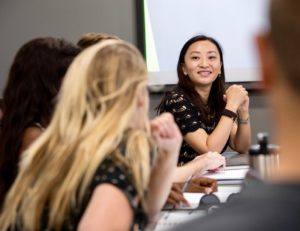Dr. Juan Meng: A Teacher-Leader
Published on December 12, 2018, at 2:34 p.m.
by Trenton Brasfield.

Dr. Juan Meng is an associate professor of public relations in the Grady College of Journalism and Mass Communication at the University of Georgia. Meng started her career as a journalist and editor covering finance for multinational corporations in Shanghai, China. She found the experience of working as a media professional and communicating with corporate public relations practitioners to be fascinating. She was captivated by what these practitioners did, and wanted to learn more.
As a result of this experience, Meng decided to come to the United States and study public relations. She received her doctorate in public relations from The University of Alabama. Her main focus of study was on leadership, reputation and employee relationships within the industry. While at the college, Meng worked with Dr. Bruce Berger, her advisor, mentor and dissertation chair.
All of her professional learning experience after she moved to the States helped her understand PR as it is now. Meng noted that she has seen a positive change in PR both in the States and globally as it has moved toward being strategic and transparent while focusing on engagement and reputation. “I feel it’s such a wonderful and amazing experience to be involved in both researching and teaching PR to a younger generation,” Meng explained.
When asked about why she chose leadership in PR as her field of research, Meng noted that the year she started her doctoral program was the same year that The Plank Center for Leadership in Public Relations was founded, which was in 2005. Berger was the founding director. The center’s dedication to leadership allowed Meng to be a part of the early initiatives to defining leadership in PR. “Leadership is a prominent subject in other fields, but never in PR,” Meng said. This dichotomy has since changed. Through her dissertation, she was able to explore what leadership meant for the PR practice.
Meng noted that a lot of the experience students gain in the classroom is theory- and method-based, which will help them build the foundation and apply what they learned to other hands-on situations such as internships or student-leading initiatives. Different skill sets will prepare them to be effective professional communicators— in order to produce quality work.
Sometimes the learning process places less focus on leadership. “It is easy to focus on the technical part because you can see immediate results, but it is not easy for someone to step up and see the long-term impact of a vision,” Meng emphasized. Meng added that having a global perspective with cultural context and sensitivity, and embracing that context, can bring leadership to the next level.

According to Meng, a leader in PR must have a vision. The leader also needs to have the ability to enlist others to believe that vision and create a shared vision through transparent communication. The value of PR has to be shown in a short-term perspective for campaigns or projects, and long-term for the overall reputation of the industry. “That is the most critical characteristic in describing a great leader,” Meng said. “Being able to work well with your members internally and externally is needed to provide quality professional work.”
When inquired about who has had an influence on her career, Meng stated Bruce Berger. “He is my role model, mentor and adviser,” Meng said. She noted how she is able to go to him when she has questions about anything. His way of advising is unique, she said, because he does not tell you what to do, but he will talk to you until you find an insight from the conversation. “I always get an inspiring moment just by talking to him,” Meng noted. “Not everyone can offer you that kind of magic moment.” Meng credits Berger with transforming her from an international student into a scholar who is able to manage multiple projects and to impact the industry and her students through her research.
Berger was just as supportive of Meng. “Juan is an outstanding colleague — highly intelligent, great character and high octane energy,” Berger explained. “She’s a wonderful professional to work with.”
Meng considers herself to instinctively be a leader. Through her research, she applies the results found to be an effective leader, which is shown through her work. “I enjoy practicing my leadership skills through the projects that I have been a part of,” Meng declared.
This sentiment was echoed in Berger’s words. “She exemplifies leadership in planning, organizing and leading research programs. She’s an excellent teacher-leader in the classroom,” Berger said. “She created and has led the highly successful China Summer-Study program at the University of Georgia.”
Meng has been in higher education for nine years, and feels “fascinated” to be able to collaborate with hard-working students. She wants to not only share her experience with them, but also to “bring them more … the global vision when defining PR.”
“It is easy and safe to stay with the local culture — it is hard to challenge yourself to understand a different culture,” Meng explained. “It is more important to understand how to practice communication and address leadership when you come across different culture contexts.”
Meng elaborated how these skills are critical for this generations of students. “We prepare you to be a good professional with solid knowledge and skill sets, but we also want to cultivate you to have that global vision — both in communication and leadership,” Meng said.
Berger summed up this teacher-leader well. “Dr. Meng is: intelligent, thoughtful, disciplined, focused, reflective, joyful, thankful, kind, smiling. I have great respect for her, and I imagine her future is even brighter,” he noted.




